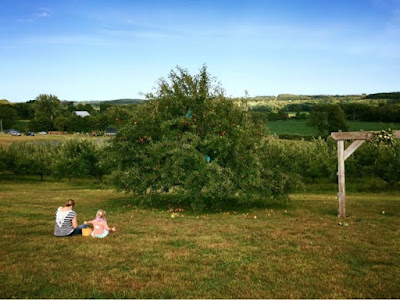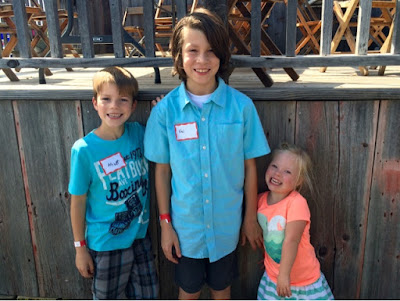Somewhere along the way, I started to create anchors for myself. I began to build my own traditions. Now it did not matter where I lived or who I was with, the traditions came with me. The annual stomping of the leaves that fell in my school courtyard, the celebration of the first cup of cocoa each winter. There were recipes I made and gave to friends as an expression of the idea of home, warmth, nourishment, goodness. Occasionally, my traditions did mirror positive moments spent with my own family. Like Old Testament altars, I stacked stones together in places where I had reasons for thanksgiving, something to help me remember and find my way back to what was good.
When I was about eleven, I remember making a trip to a pumpkin patch with my brother, stepmom, and baby sister. We walked around, climbed on hay bales, took pictures, and brought home pumpkins. We painted faces on the pumpkins and set them outside, waiting until the time was right to carve them.
It was cool and damp on the day that was set to carve the pumpkins. A windy day, where wet leaves fell and became glued to the pavement, creating a colorful, slippery collage on the ground. My aunt and cousin came over to join us for the fun, bringing big orange pumpkins of their own. We had newspaper ads spread out on the dining room table, the overhead lights turned on brightly, the day growing dark outside the patio door. The grownups were chatting and laughing as we did the work of scooping the guts out of the pumpkins. Pulling the long, stringy pulp out, heavy with seeds. We received instructions on how to separate the seeds from the pulp, with the promise of a salty, roasted treat to eat after the carving was done. I remember drawing the face on my pumpkin once, twice, three times, trying to get it absolutely perfect. I wanted the classic jack-o-lantern, perfectly circular eyes, a triangular nose, and big jagged teeth in a gaping, open-mouthed grin. The boys were nearly done carving, and I was still retracing the lines one more time, trying to get it just right.
It was warm in the house, with the oven going, and everyone gathered in so close. We cleaned up the mess and moved to sit at the pink Formica-topped breakfast counter, waiting to have our warm from the oven pumpkin-seed snack now that the dirty work was done.
As we sat there, swinging the oak bar stools back and forth, something shifted in the room. It was as though the air and light were sucked out of the space. A spark had been lit, and my dad was turning to fire, as he did so often those days. Everyone held their breath as he pulled all of the oxygen to himself. I don't know what started the argument. I didn't hear it escalate. I only heard my aunt trying to reason with my dad, and I heard him tell her to get the hell out of his house. She held out her hands towards him while he shouted, as though her upturned palms could ward off the brutality in his voice. I saw the shift in his body, the motion of his arm moving into her, and saw her double-over when his fist sunk into her belly.
It's a mystery, the moments our brain chooses to remember, the shadows that lodge themselves in our mind, the events we cannot forget.
When I think about it now, I have to really focus to remember much about what came before it all fell apart. I recall holding my baby sister at the pumpkin patch, trying to keep her still, and smiling for the camera. I know that I was squinting into the bright midday sun. I remember the fresh smell of just cut pumpkin that night, the slimy and rough feel of the strings of pulp slipping through my fingers. I reach for those moments, the happy ones, the place where everyone is smiling and laughing at the countertop, just before it turns. Because the darker memories come more easily; the trauma is harder to forget.
So in my life now, I am forever striving to find my way back to the altars, cling to the anchors, to carve out memories for my own children. I don't want them to have to search to find a joy-filled moment like the ones I knew before the room filled with fire. So we turn everything into a tradition. We do all we can every season, each year. We go together as a family to annual events and we fill our life with moments where the room is full of light and warmth and the voices of those we love.
We go apple-picking.
We eat snow cones and try the bounce house and pose for pictures.
It's a mystery, the moments our brain chooses to remember, the shadows that lodge themselves in our mind, the events we cannot forget.
When I think about it now, I have to really focus to remember much about what came before it all fell apart. I recall holding my baby sister at the pumpkin patch, trying to keep her still, and smiling for the camera. I know that I was squinting into the bright midday sun. I remember the fresh smell of just cut pumpkin that night, the slimy and rough feel of the strings of pulp slipping through my fingers. I reach for those moments, the happy ones, the place where everyone is smiling and laughing at the countertop, just before it turns. Because the darker memories come more easily; the trauma is harder to forget.
So in my life now, I am forever striving to find my way back to the altars, cling to the anchors, to carve out memories for my own children. I don't want them to have to search to find a joy-filled moment like the ones I knew before the room filled with fire. So we turn everything into a tradition. We do all we can every season, each year. We go together as a family to annual events and we fill our life with moments where the room is full of light and warmth and the voices of those we love.
We go apple-picking.
We eat snow cones and try the bounce house and pose for pictures.
We pet the ponies and the goats and look at the chickens.
We milk the cow.
We take the hayride.
We run the corn maze.
We get hot and sweaty and cranky, and not every single moment together is filled with warmth and laughter and perfection. But some of them are.
And the world doesn't break apart. The earth doesn't spin off its axis. The memories don't burn up in a fiery rage. I pray and pray that even though we get it wrong sometimes, my little ones won't have to search too deep to find the good parts. So we make the traditions happen again, season after season, year after year. And every time one of my children asks me, "When are we going apple picking this year?" or says, "It's about time to make hot cocoa," or reminds me, "We need to start making holiday cookies soon," I add a stone to the altar of my gratitude, and my heart heals a little more.
As the years pass, and time stretches out behind me and marches on in front of me, I don't have to search so far or look so deep to find the happy memories. They are growing all around me.










